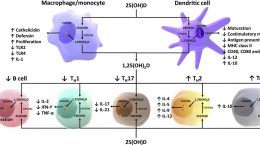Published on August 13, 2021
Video Friday: This short clip reviews research on vitamin D for immune function, respiratory infections, COVID-19, and the potential for vitamin D toxicity
This short, educational video features Dr. Roger Seheult and Dr. Rhonda Patrick as they discuss how to assess vitamin D requirements for immune function and its toxicity potential.
While the current recommended daily allowance for vitamin D was established based on its role in bone metabolism, there is great reason to question whether these levels are sufficient for optimal immunological functioning. This video clip reviews research to suggest that vitamin D levels below 30 ng/ml (75 nmol/L) are associated with a higher risk of death from all causes, and others that indicate higher vitamin D levels (closer to 50 ng/ml) may benefit the immune response and help protect against SARS-CoV-2.
Watch the Video
After watching the video, be sure to make note of our added details below!
Vitamin D for Immune Function – How much to take, and what is too much?
Here is a quick summary of what this video discusses, along with additional information and details from GrassrootsHealth:
- There are several forms of vitamin D. 25-hydroxyvitamin D, or 25(OH)D, is the form that is measured in the blood to determine a person’s vitamin D status. While it is fat soluble, the ratio of vitamin D in the blood vs fat remains constant.
- Levels below 50 ng/ml (125 nmol/L) have been linked to increase in SARS-CoV2 positivity rate. A meta-analysis on vitamin D and COVID-19 also illustrated the effect of vitamin D on the risk of infection, severity, and death due to COVID-19.
- Levels associated with improved immune function and decreased risk of infection are much higher than the suggested sufficiency cut-off level of 20 ng/ml (50 nmol/L) set by the IOM (Institute of Medicine, now the National Academy of Medicine) based on bone health
- In this video, Dr. Keith Baggerly discusses the math and science used to determine the current recommended vitamin D serum levels and supplementation amounts, and where the IOM got it wrong. The mistakes in calculation led to recommendations that are way too low for public health, leading to widespread vitamin D deficiency even among those receiving medical care and attention.
- A meta-analysis of 32 studies published in 2014 by Garland et al. showed that levels below 30 ng/ml (75 nmol/L) were associated with a higher risk of death from all causes while levels between 40-70 ng/ml (100-175 nmol/L) had the lowest all-cause mortality
And then there’s how to achieve those levels…
The Upper Level Intake was set at 4000 IU per day.
Is that enough? Too much?
- Vitamin D is most likely the least toxic fat-soluble vitamin. According to a Mayo Clinic publication involving data from over 20,000 people – “There is enough evidence that vitamin D toxicity is one of the rarest medical conditions and is typically due to intentional or inadvertent intake of extremely high doses of vitamin D (usually in the range of >50,000 – 100,000 IU/day for months to years) without monitoring for hypercalcemia.”
- Another study by McCullough et al. showed no adverse events related to vitamin D supplementation and no cases of vitamin D induced hypercalcemia with doses of up to 50,000 IU per day
- The vitamin D level responds differently to supplementation with different starting levels, intakes, and other various factors. It is vital to test and re-test to make sure that the daily dose or vitamin D routine is achieving and maintaining the desired target vitamin D level.
Measure Your Level of Vitamin D and Other Nutrients Important for Immune Health
 Having and maintaining healthy vitamin D levels and other nutrient levels can help improve your health now and for your future. Choose which to measure, such as your vitamin D, omega-3s, and essential minerals including magnesium, selenium and zinc, by creating your custom home test kit today. Take steps to improve the status of each of these measurements to benefit your overall health. You can also track your own intakes, symptoms and results to see what works best for YOU.
Having and maintaining healthy vitamin D levels and other nutrient levels can help improve your health now and for your future. Choose which to measure, such as your vitamin D, omega-3s, and essential minerals including magnesium, selenium and zinc, by creating your custom home test kit today. Take steps to improve the status of each of these measurements to benefit your overall health. You can also track your own intakes, symptoms and results to see what works best for YOU.
Enroll and test your levels today, learn what steps to take to improve your status of vitamin D (see below) and other nutrients and blood markers, and take action! By enrolling in the GrassrootsHealth projects, you are not only contributing valuable information to everyone, you are also gaining knowledge about how you could improve your own health through measuring and tracking your nutrient status, and educating yourself on how to improve it.
Help everyone Move Research into Practice with vitamin D and other nutrients! As a special birthday gift to everyone, in honor of the science, we have created a special scholarship fund for anyone to donate to that will go towards helping others participate. Your donation will allow anyone to get help with funding their participation when they need it.
Text-to-give: Text Daction to 44321 to add to our Scholarship Fund.






